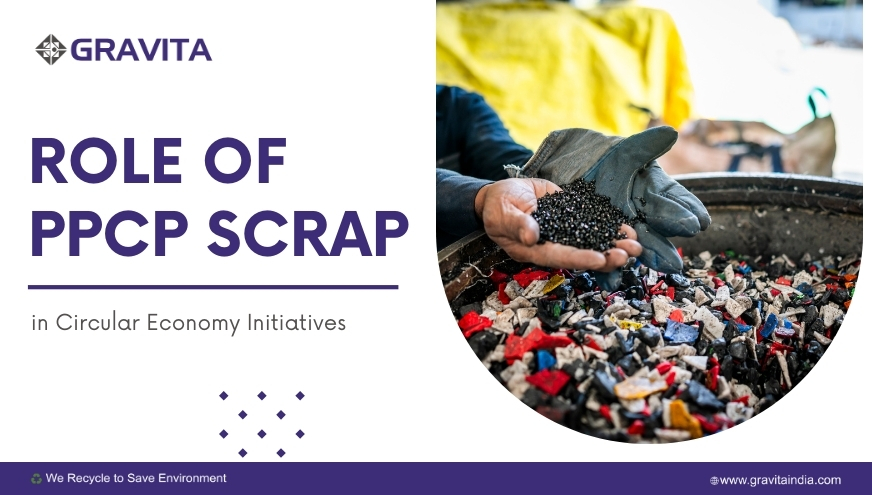In the quest for sustainable development, the circular economy has emerged as a vital framework. It focuses on reducing waste, maximizing resource efficiency, and promoting the reuse and recycling of materials. One significant element within this paradigm is the management and recycling of polypropylene copolymer (PPCP) scrap. This material, commonly found in various industries, plays a pivotal role in advancing circular economy initiatives

Understanding PPCP Scrap
Polypropylene copolymer (PPCP) is a versatile thermoplastic polymer known for its toughness, flexibility, and resistance to fatigue and impact. It is widely used in automotive parts, packaging, household goods, and medical devices. Due to its extensive use, a substantial amount of PPCP waste is generated annually. Proper management and recycling of PPCP scrap are essential to mitigate environmental impact and promote resource efficiency.
PPCP Scrap and Circular Economy
The circular economy aims to create a closed-loop system where products and materials are reused, repaired, refurbished, and recycled to extend their lifecycle. PPCP scrap, when effectively managed, can significantly contribute to this goal. Here’s how:
1. Resource Efficiency and Conservation:
○ Recycling PPCP scrap reduces the demand for virgin polypropylene, conserving natural resources such as petroleum, which is a primary raw material for producing polypropylene. By recycling PPCP, industries can decrease their reliance on finite resources and minimize the environmental footprint associated with extraction and processing.
2. Energy Savings:
○ The production of virgin polypropylene involves energy-intensive processes. Recycling PPCP scrap requires significantly less energy, resulting in substantial energy savings. This reduction in energy consumption not only lowers greenhouse gas emissions but also contributes to overall energy efficiency.
3. Waste Reduction:
○ One of the core principles of the circular economy is minimizing waste. By recycling PPCP scrap, industries can divert substantial amounts of plastic waste from landfills and incineration. This reduction in plastic waste helps alleviate the burden on waste management systems and minimizes environmental pollution.
4. Economic Benefits:
○ The recycling industry creates economic opportunities and jobs. Establishing robust PPCP recycling systems can stimulate local economies and provide employment opportunities in collection, sorting, processing, and manufacturing. Additionally, recycled PPCP can be a cost-effective alternative to virgin materials, reducing production costs for manufacturers.
5. Innovation and Technological Advancements:
○ The drive to recycle PPCP scrap has spurred innovation and technological advancements in the recycling industry. New methods and technologies are being developed to improve the efficiency and quality of PPCP recycling processes. These innovations not only enhance recycling rates but also open up new avenues for utilizing recycled PPCP in high-value applications.
6. Sustainable Product Design:
○ Product design that uses recycled PPCP encourages sustainability. Producers are progressively embracing eco-design concepts, in which items are made to be easily disassembled, repaired, and recycled. Such designs that incorporate recycled PPCP are in line with the circular economy's objectives of producing goods with longer lifecycles and less environmental effect.
Challenges and Opportunities
While the benefits of recycling PPCP scrap are clear, several challenges must be addressed to fully realize its potential within the circular economy:
1. Collection and Sorting:
○ Efficient collection and sorting systems are crucial for successful recycling. Implementing a robust collection infrastructure and educating consumers and businesses about the importance of proper disposal and segregation of PPCP waste are essential steps.
2. Quality and Contamination:
○ Ensuring the quality of recycled PPCP is vital for its successful reuse. Contamination from other materials can hinder the recycling process and affect the properties of the recycled product. Advanced sorting and cleaning technologies are needed to address this challenge.
3. Market Demand:
○ Creating a stable market demand for recycled PPCP is essential. Encouraging industries to incorporate recycled materials into their products through incentives, regulations, and awareness campaigns can drive demand and support the growth of the recycling industry.
4. Technological Advancements:
○ Continued investment in research and development is necessary to improve recycling technologies and processes. Innovations in chemical recycling, for instance, can enhance the quality and versatility of recycled PPCP, making it suitable for a wider range of applications.
PPCP scrap plays a vital role in advancing circular economy initiatives by promoting resource efficiency, reducing waste, saving energy, and fostering economic growth. By addressing the challenges associated with PPCP recycling and leveraging the opportunities it presents, industries can contribute significantly to a more sustainable and resilient future. Embracing the principles of the circular economy and integrating recycled PPCP into product lifecycles are essential steps toward achieving a greener and more sustainable world. For those looking to contribute to this effort, finding a reliable PPCP Scrap Buyer in India can be a significant step in ensuring effective recycling and reuse of materials.



